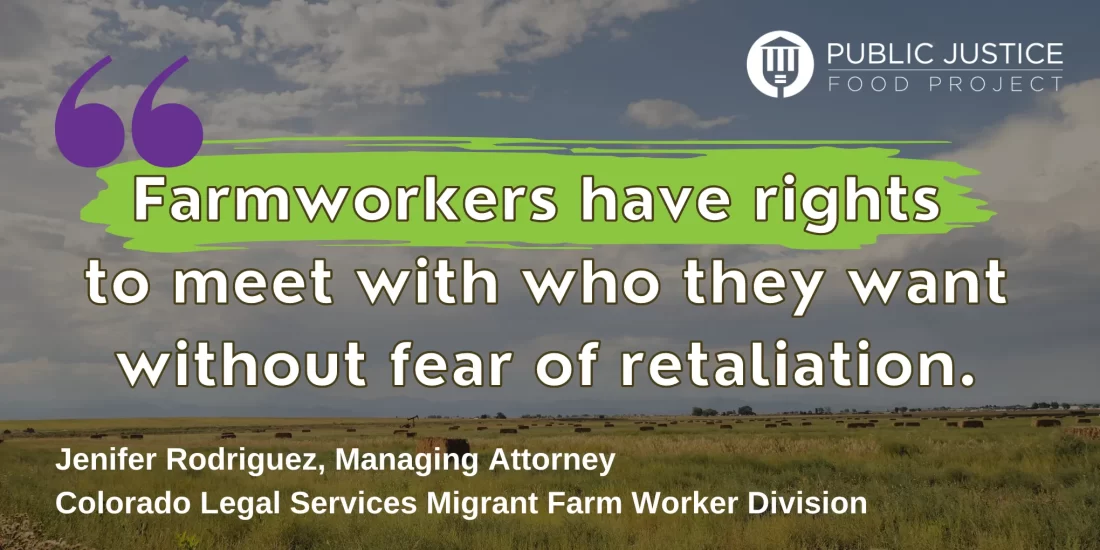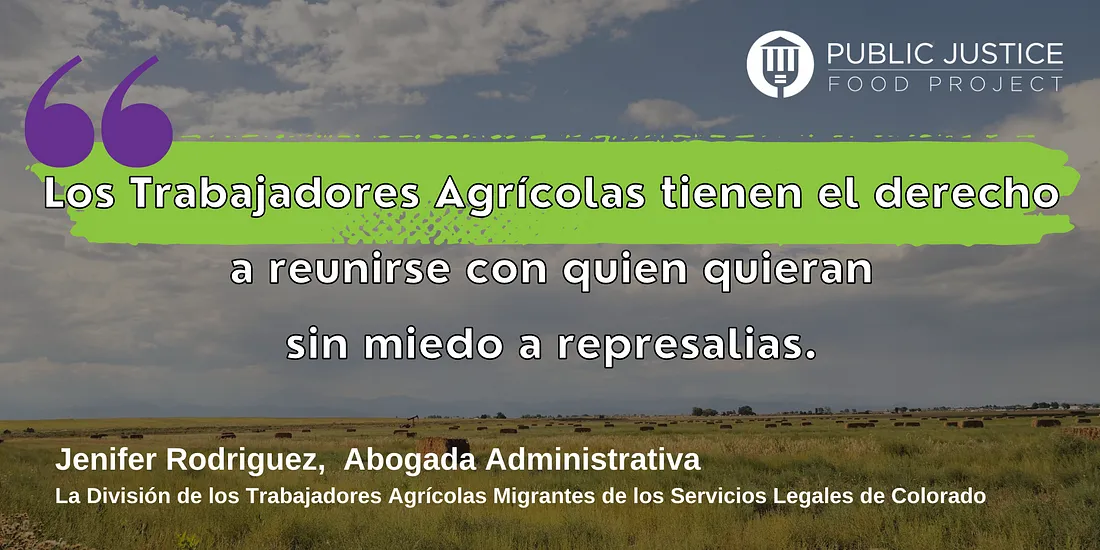
Representing Isolated Farmworkers
Attorney Jenifer Rodriguez shares the challenges and wins of farmworker advocacy in Colorado
*Lea este artículo en español abajo*
Every person, regardless of where they come from, what they do for work, or where they live, should have access to fundamental services like healthcare, education, and legal help.
As the managing attorney for Colorado Legal Services’ Migrant Farm Worker Division, Jenifer Rodriguez leads a team to make that vision a reality for farmworkers in Colorado. But her team’s work was complicated by a recent lawsuit filed by a group of agribusinesses against the State of Colorado. The case sought to undo the progress made by a recent Farmworker Bill of Rights, which guaranteed workers’ ability to meet with service providers like doctors, lawyers, and teachers in their homes. We’re proud to partner with Towards Justice and Farmworker Justice to intervene in that litigation and represent Colorado Legal Services to defend farmworkers’ rights. In this interview, Jenifer Rodriguez shares what it’s like providing legal services to isolated farmworkers in Colorado and why that work must be protected.
What do you do with Colorado Legal Services and why is it important?
Our team offers legal help to farmworkers when they’re faced with harmful situations related to their employment. Farmworkers have been and continue to be denied fundamental rights. They are vulnerable to all kinds of workplace abuse, much of which is due to the longstanding, racist exclusions of farmworkers from laws that provide protections to most other workers in effort to maintain a system of labor exploitation of a historically Black and immigrant workforce. So our team provides legal support on a wide range of issues, including wage theft, workplace injuries, sexual harassment, immigration, and human trafficking. We want to make sure farmworkers are aware of and able to access the legal services they have a right to access.
Why is it important to be able to meet agricultural workers at the farms where they work and often live?
Farmworkers tend to be very isolated. They are required to work long hours, 6 to 7 days a week at times and without flexibility for time off to go see a lawyer, a doctor, or a teacher. Many are on temporary visas and rely on employer-provided housing. They rarely have access to transportation, and when they do, it can look like a bus or van that only goes from worksite to housing, and occasionally Walmart on a Sunday. Visiting them at their homes is the only practical way to meet them.
What is the Farmworker Bill of Rights and how has your work been impacted by it?
The Farmworker Bill of Rights has brought about a lot of positive change for our work and for the farmworkers we support. It was passed in 2021 and it provides protections for farmworkers against things like heat stress and retaliation from employers, as well as securing minimum wage, overtime pay, and farmworkers’ right to organize. It also ensures that farmworkers can have visitors and meet with service providers like healthcare workers, teachers, and lawyers where they live, so it supports our work in that way. When we visit farmworkers, we keep a copy of the bill with us as proof that the law gives us the right to visit farmworkers at the labor camps. The bill moves us towards the basic rights and access to services that people who live and work on farms, like all people, deserve.
“Historically, isolating farmworkers has made it easier for agribusinesses to exploit them.”
How is the Farmworker Bill of Rights being threatened, and what has that meant for your work?
A group of agribusinesses challenged the parts of the Farmworker Bill of Rights ensuring access to key service providers, claiming that this violates their property rights. The lawsuit had a chilling effect on farmworkers and outreach workers, which would be made worse if the agribusinesses had their way.
Because of the lawsuit, agribusinesses felt emboldened to block access to critical resources and services for their workers. For example, there’s a labor camp on a farm at the bottom of a canyon that we try to visit every year, and it’s very difficult to access. Last time we went there, the property owner came out and yelled at our team to get off the property. The owner flashed a handgun at us and suggested that bad things happen to those who come onto his property. He punched the palm of his hand, gesturing at our team and at the workers, to intimidate those who engage with us.
Those who do outreach to farmworkers and other low income and vulnerable working people couldn’t see this lawsuit as anything but a reversal of the rights of the workers.
Why do farm owners care so much about you coming to visit farmworkers?
Historically, isolating farmworkers has made it easier for agribusinesses to exploit them. They have an interest in keeping workers unaware of their rights and separated from the broader community and resources available to them.
We see many farm owners that take a paternalistic attitude towards their workers, controlling their every move. The same employers who are concerned about people coming onto their property, also tend to be the ones who restrict the farmworkers’ ability to leave the property, whether that’s going to visit friends, the movie theater, or to see their family. They don’t treat farmworkers like human beings with agency, and this lawsuit is only the latest example of that attempt to control workers’ lives.
But no one should need their boss’s permission to meet with a legal advocate, access healthcare, or invite someone into their homes. Workers have rights just like you or I to meet with who they want without fear of retaliation.
Can you share about the latest update in the lawsuit?
After we intervened in the federal lawsuit, the agribusinesses dismissed the case. Basically, a bunch of agriculture companies tried to use the courts to spread misinformation and intimidate service workers like us from meeting with farmworkers where they live. Then we challenged them, and they ran away. So agribusinesses were trying to use the courts to isolate farmworkers, and cared more about that than about securing anyone’s rights under the law. This also shows that by showing up in the courtroom, making a good case, and telling our story, we can make a big impact and protect workers’ rights.
How does this impact the lives of agricultural workers and service providers?
Right now, there’s no pending challenge to the Farmworker Bill of Rights, so the law stands and can be enforced. Because we intervened, farmworkers in Colorado have the right to access essential services like healthcare, legal help, and education at the farms where they work and often live. On our end, we know that we have the law on our side when we’re visiting farmworkers and we can continue our critical work without threats of violence and intimidation.
Learn more about our case defending farmworkers’ rights in Colorado. Read about and support the work of the Colorado Legal Services Migrant Farm Worker Division.
If you would like to get in contact with us regarding a potential case, please fill out an intake form or call us at (202) 630-3095. We can speak with you in almost any language.
Representando a los Trabajadores Agrícolas Aislados
La abogada Jenifer Rodriguez comparte los retos y victorias de la defensa de los trabajadores agrícolas en Colorado
Cada persona, independientemente de dónde sean, de qué trabajo hacen, o en donde viven, deben tener acceso a los servicios fundamentales tales como la atención médica, educación, y ayuda legal.
En el puesto de abogada administradora de La División de los Trabajadores Agrícolas Migrantes de los Servicios Legales de Colorado (Colorado Legal Services’ Migrant Farm Worker Division), Jenifer Rodriguez lidera un grupo para hacer esa visión una realidad para los trabajadores agrícolas de Colorado. Pero el trabajo de su equipo se complicó por una reciente demanda presentada por el grupo de negocios agrícolas contra el estado de Colorado. El caso buscó anular el progreso que logró una reciente Carta de Derechos de Los Trabajadores Agrícolas, que les garantizaba a los trabajadores la habilidad de ver a proveedores de servicios tales como doctores, abogados, y maestros en sus hogares. Estamos orgullosos de ser socios con Hacia La Justicia (Towards Justice) y Justicia de Trabajadores Agrícolas (Farmworker Justice) para intervenir en el litigio y representar a Los Servicios Legales de Colorado (Colorado Legal Services) para defender los derechos de los trabajadores agrícolas. En esta entrevista, Jenifer Rodriguez comparte su experiencia de proveer servicios legales a trabajadores agrícolas aislados en Colorado y porque este trabajo debe protegerse.
¿Qué es lo que hace con Los Servicios Legales de Colorado (Colorado Legal Services) y porque es esto importante?
Nuestro equipo ofrece ayuda legal a los trabajadores agrícolas cuando enfrentan situaciones dañinas relacionadas a su empleo. A los trabajadores agrícolas se les ha negado y se les continúa negando los derechos fundamentales. Son vulnerables a toda clase de abuso en el lugar de trabajo, y mucho se debe a la exclusión de trabajadores agrícolas de las leyes antiguas y racistas que protegen a la mayoría de otros trabajadores, como parte de un esfuerzo de mantener a un sistema de explotación laboral de una fuerza laboral historicamente negro e inmigrante. Por eso nuestro equipo provee apoyo legal en una amplia gama de temas, incluyendo el robo salarial, lesiones en el trabajo, acoso sexual, inmigración, y trafico humano. Queremos asegurarnos que los trabajadores agrícolas conozcan y tengan acceso a los servicios legales que tienen derecho a acceder.
¿Por qué es importante reunirse con los trabajadores agrícolas en los campos en donde trabajan y en donde viven en muchos casos?
Los trabajadores agrícolas tienden a estar aislados. Se les requiere trabajar horas largas, 6 o 7 días a la semana en ocasiones y sin flexibilidad de días libres para ver a un abogado, doctor, o maestro. Muchos tienen visas temporales y dependen de viviendas proveídas por el empleador. Tienen raro acceso a la transportación, y cuando lo tienen, puede verse como un autobús o camioneta que solo va del sitio de trabajo a la vivienda, y ocasionalmente a Walmart el domingo. Visitarlos en sus hogares es la única manera práctica de reunirse con ellos.
¿Qué es la Carta de Derechos de Los Trabajadores Agrícolas (Farmworker Bill of Rights) y cómo ha impactado su trabajo?
La Carta de Derechos de Los Trabajadores Agrícolas (Farmworker Bill of Rights) ha traído muchos cambios positivos a nuestro trabajo y para los trabajadores agrícolas a quienes apoyamos. Fue aprobada en el 2021 y provee protecciones para los trabajadores agrícolas contra cosas como el estrés por el calor y represalias de los empleadores, así como también asegurar el salario mínimo, pago por horas extras, y el derecho de los trabajadores agrícolas a organizarse. También asegura que los trabajadores agrícolas puedan tener visitantes y reunirse con proveedores de servicios como trabajadores de atención médica, maestros, y abogados en donde viven, y así apoyar nuestro trabajo. Cuando visitamos a los trabajadores agrícolas, mantenemos una copia de la carta en mano como prueba de que la ley nos otorga el derecho a visitar a los trabajadores agrícolas en los campos laborales. La carta nos lleva hacia los derechos básicos y acceso a servicios que las personas que viven y trabajan en los campos, así como todas las personas, merecen.
Históricamente, aislar a los trabajadores agrícolas le ha hecho más fácil a la agroindustria para explotarlos.
¿Cómo está a riesgo la Carta de Derechos de Los Trabajadores Agrícolas, y qué impacto tiene en su trabajo?
Un grupo de agroindustria retó las partes de la Carta de Derechos de Los Trabajadores Agrícolas que asegura el acceso a los proveedores de servicios claves, afirmando que esto viola los derechos de sus propiedades. La demanda tuvo un efecto paralizador en los trabajadores agrícolas y los trabajadores de alcance, algo que empeoraría si la agroindustria logra su meta.
Debido a la demanda, la agroindustria se sintió alentada a bloquear el acceso a los recursos críticos y a los servicios para los trabajadores. Por ejemplo, hay un campo laboral en un campo al pie de una barranca que tratamos de visitar cada año, y es muy difícil tener acceso. La última vez que estuvimos allí, el dueño de la propiedad salió y le gritó a nuestro equipo para que salieran de la propiedad. El dueño nos mostró su pistola e insinuó que les pasaría algo malo a las personas que entraran a su propiedad. Golpeó la palma de su mano, gesticulando a nuestro equipo y a los trabajadores, para intimidar a aquellos que tuvieran contacto con nosotros.
Aquellos quienes hacen alcance a los trabajadores agrícolas y a otras personas vulnerables y de bajos ingresos, no pudieron ver esto de otra manera más que un retroceso de los derechos de los trabajadores.
¿Por qué les importa tanto a los granjeros que vayan a visitar a los trabajadores agrícolas?
Históricamente, aislar a los trabajadores agrícolas le ha hecho más fácil a la agroindustria explotarlos. Tienen el interés de mantener a los trabajadores inconscientes de sus derechos y separados de la comunidad en general y de los recursos disponibles.
Vemos a muchos dueños de fincas que toman una actitud paternalista hacia sus trabajadores, controlando cada paso que toman. Los mismos empleadores que se preocupan de que las personas entren a sus propiedades, también tienden a ser quienes restringen a los trabajadores a salir de la propiedad, ya sea para visitar a sus amigos, ir al cine, o a ver a su familia. No tratan a los trabajadores agrícolas como seres humanos con agencia libre, y esta demanda es solamente el más último ejemplo de ese esfuerzo de controlar la vida de los trabajadores.
Pero nadie debe necesitar el permiso del jefe para reunirse con un defensor legal, acceder a la atención médica, o para invitar a alguien a sus hogares. Los trabajadores tienen derechos como tú o como yo de reunirse con él quien quieran sin temor a las represalias.
¿Puede compartir la última actualización de la demanda?
Después de que intervenimos en la demanda federal, la agroindustria desestimó el caso. Básicamente, una cantidad de compañías agrícolas trataron de usar las cortes para divulgar desinformación e intimidar a los trabajadores de servicios como nosotros a reunirnos con los trabajadores agrícolas en donde viven. Luego los retamos, y se dieron por vencidos. Entonces la agroindustria estaba tratando de usar las cortes para aislar a los trabajadores agrícolas, y les importaba hacer eso más que asegurar los derechos de alguna persona bajo la ley. Esto demuestra que al presentarnos en el tribunal, al preparar un buen caso, y al contar nuestra historia, podemos tener un gran impacto y proteger los derechos de los trabajadores.
¿Cómo afecta esto la vida de los trabajadores agrícolas y a los proveedores de servicios?
Ahora, no hay algún reto pendiente a La carta de Derechos de Los Trabajadores, por eso la ley está vigente y puede hacerse cumplir. Porque intervenimos, los trabajadores agrícolas de Colorado tienen el derecho al acceso de servicios esenciales tales como la asistencia médica, la ayuda legal, y la educación en las fincas en donde trabajan y en donde viven en muchos casos. De nuestra parte, sabemos que tenemos a la ley de nuestro lado cuando visitamos a los trabajadores agrícolas y podemos continuar nuestro trabajo crítico sin amenazas de violencia o de intimidación.
Aprenda más sobre nuestro caso de defensa de los derechos de los trabajadores agrícolas en Colorado. Lea sobre nuestro trabajo y apoye a la División de los Trabajadores Agrícolas Migrantes de los Servicios Legales de Colorado.
Si quiere ponerse en contacto con nosotros sobre un caso posible, por favor llene un formulario de admisión o llámenos al (202) 630-3095. Podemos hablar con usted en casi cualquier idioma.

